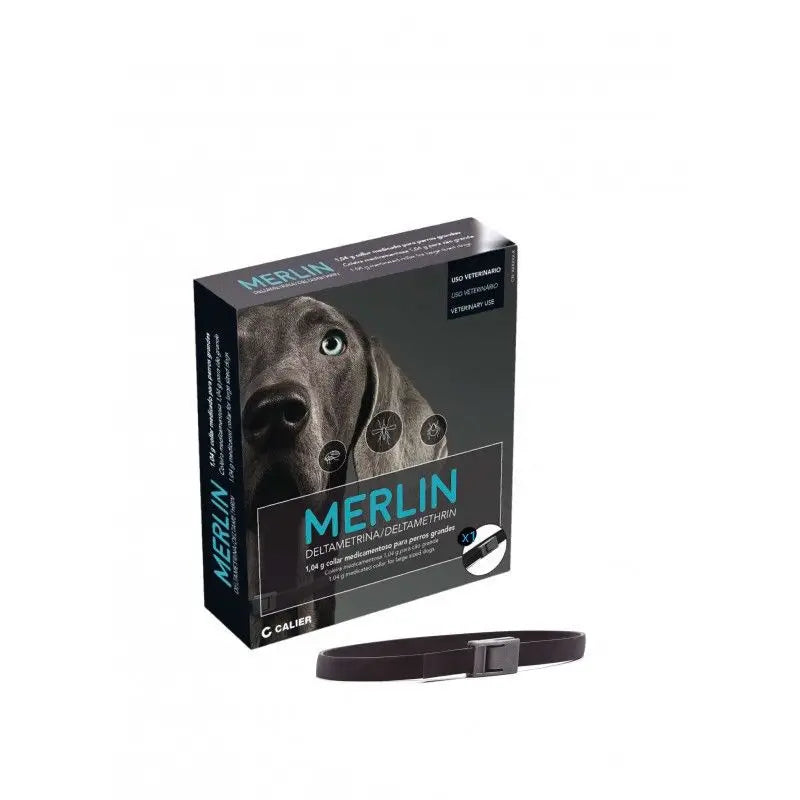The Calier Merlin 65cm collar is an anti-parasite product for dogs. It comes in a pack of 2 and is designed to protect your pet against fleas, ticks and other parasites. This collar is water resistant and lasts up to 6 months, providing continuous and effective protection for your dog.

Merlin Collar 1,04 Gr Dog 65 Cm 2 Ud
External Antiparasitic, recommended for dogs.
Merlin 1,04 g drug collar for large dogs
One 65 cm (26 g) collar contains:
Active substance:
Deltamethrin
1,04 g
Drug collar
Black collar releasing a white powder.
Target species:
Dogs
Indications for use, specifying target species:
The veterinary medicinal product provides:
- Continuous flea (Ctenocephalides felis) control activity for 16 weeks;
- Continuous tick (Ixodes ricinus) control activity for 6 months;
- Activity that prevents feeding and promotes control of sandflies (Phlebotomus perniciosus) for 5.5 months.
Do not use in puppies under 7 weeks of age.
Do not use in dogs with skin lesions.
Do not use in cases of hypersensitivity to the active substance or to any of the excipients.
Do not use in cats. Deltamethrin is harmful to cats.
Special warnings for each target species:
The collar reaches its maximum effect after one week, therefore, it should be applied 1 week before animals may be exposed to infestation.
Ticks and sandflies die and fall off the dog within 48 hours and 24 hours respectively after exposure, usually without having sucked blood. It is not possible to prevent ticks from attaching or sandflies from biting after treatment. For this reason, the transmission of infectious diseases by ticks or sandflies cannot be completely excluded in case of unfavourable conditions.
For optimal control of flea infestations in multi-pet households, all dogs should be treated at the same time.
Fleas often infest the pet's basket, bedding and regular resting areas such as carpets and soft furnishings. They should be treated with an appropriate insecticide in case of massive infestation and when initiating control measures and should be vacuumed regularly.
In case of skin lesions the collar should be removed until symptoms have disappeared.
The influence of shampooing on duration or efficacy has not been investigated.
Occasional contact with water does not reduce the effectiveness of the collar.
Specific precautions to be taken by the person administering the veterinary medicinal product to animals
Accidental ingestion of this product may cause adverse reactions, including neurotoxic effects.
Keep the product in the original packaging. Keep the collar in the bag until use. Do not smoke, eat or drink while handling the collar. Children should not be allowed to play with the collar or put it in their mouth. Immediately dispose of any debris or cut parts of the collar. Wash hands with cold water after adjusting the collar.
Avoid prolonged contact with the collar or the dog wearing the collar. This includes sharing bedding with collared dogs. This is especially important for children.
In case of oral exposure or accidental ingestion, consult a physician and show the package leaflet or label to the physician.
Deltamethrin may cause hypersensitivity (allergy) reactions in sensitive individuals. Persons with known hypersensitivity to deltamethrin should avoid all contact with the veterinary medicinal product and the treated dog. Contact a doctor in case of hypersensitivity reactions.
Other precautions
Deltamethrin is toxic to aquatic organisms. Dogs wearing the collar are not allowed to enter watercourses.
Adverse reactions (frequency and severity):
Local skin reactions (pruritus, erythema, hair loss) on the neck or general skin have been observed on rare occasions. In very rare cases, altered behaviour (e.g. lethargy or hyperactivity) often associated with skin irritation has also been reported.
Gastrointestinal symptoms such as vomiting, diarrhoea and sialorrhoea have been observed very rarely.
Very rarely, neuromuscular problems such as ataxia and muscle tremors have been observed. Symptoms usually disappear within 48 hours after removal of the collar.
If any of these symptoms occur, the collar should be removed and a veterinarian should be contacted.
The frequency of adverse reactions should be classified according to the following groups:
- Very frequently (more than 1 animal per 10 animals treated exhibits adverse reactions during a treatment).
- Frequently (more than 1 but fewer than 10 animals per 100 animals treated)
- Infrequently (more than 1 but less than 10 animals per 1,000 animals treated)
- Rarely (more than 1 but less than 10 animals per 10,000 animals treated)
- Very rarely (less than 1 animal per 10,000 animals treated, including isolated cases).
Use during pregnancy, lactation or laying:
Laboratory studies have not produced any indication of developmental or embryonic effects. However, the safety of the veterinary medicinal product during pregnancy in dogs has not been demonstrated. Therefore, the product should only be used during pregnancy and lactation in accordance with the benefit/risk assessment carried out by the responsible veterinarian.
Interaction with other medicinal products and other forms of interaction:
Do not use with other ectoparasiticides (pyrethroids, organophosphates).
Posology and route of administration:
For external and dermal use only. The collar should be fastened around the dog's neck. Remove the collar from the protective pouch just before use. Fit the collar around the animal's neck: not too loose and not too tight. Two fingers should fit between the collar and the dog's neck. Cut off the excess of more than 5 cm. Check regularly and adjust easily by pressing the top of the buckle and sliding the collar into the correct position.
Overdosage (symptoms, emergency measures, antidotes), if necessary:
In the unlikely event that the dog eats the collar, the following symptoms may occur: uncontrolled movements, trembling, drooling or salivation, vomiting, stiffness of the hindquarters. These symptoms usually disappear within 48 hours.
For more information about symptomatic treatment, it is advised that you contact your local veterinarian.
local veterinarian.
